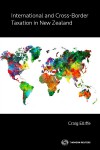Taking stock of international tax changes 2016
 Article author – Professor Craig Elliffe is Professor of Taxation in the Faculty of Law and the University of Auckland and the author of International and Cross-Border Taxation in New Zealand published by Thomson Reuters NZ. (This article originally appeared in Taxation Today )
Article author – Professor Craig Elliffe is Professor of Taxation in the Faculty of Law and the University of Auckland and the author of International and Cross-Border Taxation in New Zealand published by Thomson Reuters NZ. (This article originally appeared in Taxation Today )
The amount of tax paid by multinationals
International tax has been front-page news in New Zealand as the Government grapples with some difficult policy decisions. The first major issue concerns the amount of tax paid by large multinationals. An investigation into the level of taxation paid by large multinational companies operating in New Zealand suggests that the effective rate of tax is very much lower than the expected corporate tax rate. The implication is clear — multinationals are structuring their affairs to significantly reduce their New Zealand tax burden. This perception (whether it is correct or not) in turn provokes allegations of unfairness. On the one hand, commentators point to the relatively high contribution that corporate tax makes to the overall tax take relative to other OECD countries. While on the other hand, an effective rate of tax of 1.8 per cent for 30 large multinational companies seems indefensible. Perhaps, to reconcile these two points of view, domestic companies are paying their fair share, and maybe many multinational subsidiaries are as well? It may be that only very large and very sophisticated multinationals are the issue. This has led to the suggestion that the Government should consider similar anti-avoidance rules to those in the United Kingdom and Australia.
Panama paper leaks
The second item of news is the so-called “Panama paper leaks”. The New Zealand role in facilitating, through the use of foreign trusts, foreigners’ ability to structure their investments has called into question the issue of tax competition and New Zealand’s international reputation. The question is whether New Zealand is operating a harmful tax regime by providing an exemption from New Zealand taxation for New Zealand-based trustees in the foreign trust rules. Alternatively, supporters of the regime suggest that the level of disclosure and the principled basis for the rules (taxation based on the tax residence of the settlor of the trust) mean that it has a legitimate role to play in the New Zealand tax system. The Government has, of course, decided that an independent inquiry into the foreign trust disclosure rules is necessary before formulating an appropriate future course of action.
Ensuring NZ's international tax is adequate & effective
Against this background of public debate and discussion there has been, over the last few years and now, a consistent attempt to ensure the adequacy and effectiveness of New Zealand’s international tax regime. Part of this is a consideration of New Zealand’s response to the OECD proposals on Base Erosion and Profit Shifting (BEPS), while other domestic reforms independent of the OECD continue. Much of the focus is on how non-residents are taxed in New Zealand or on other inbound investment through multinational subsidiaries based in New Zealand. New Zealand tax policy has to balance being an attractive place to do business for non-residents with the fairness of the system for New Zealand residents and the perception that everyone contributes equally.
Taxation (Residential Land Withholding Tax, GST on Online Services, and Student Loans) Bill
One of the pieces of legislation expected to be passed by Parliament in May is the Taxation (Residential Land Withholding Tax, GST on Online Services, and Student Loans) Bill. This legislation addresses this question of equality by imposing GST on non-resident suppliers of cross-border services and intangibles. New Zealand is following the OECD recommended approach in the guidelines, which are part of the broader BEPS programme. Requiring non-resident providers of remote services to New Zealand tax residents to register for New Zealand GST, and return GST on those sales, is broadly consistent with legislation that already operates in the European Union, Norway, South Korea, Switzerland and South Africa. Our new rules are similar to proposals in Australia and Japan. One of the further matters to be considered is how to deal with the collection of GST on low-value imported goods. The Government intends to align the collection of GST on imported goods with the collection of GST on cross-border services and intangibles (and hence remove the current de minimus threshold), but as no other country has yet adopted such a system it is carefully considering its options.
As the title suggests, the Taxation (Residential Land Withholding Tax, GST on Online Services, and Student Loans) Bill also introduces a new withholding tax on non-residents selling residential property within the bright-line test threshold of two years. Once again, this is a balancing act but in this situation there is no desire to attract non-resident investors into the residential property market. In fact, it may well emerge that a land tax is targeted specifically at non-resident investors to discourage the demand side of what is perceived to be an overheated market.
Other legislation expected in 2016
Three other proposed pieces of legislation effecting changes in international tax are expected in 2016.
1 New rules for non-residents withholding tax & reform of taxation of interest
The first omnibus tax Bill expected in May this year will propose new rules for non-resident withholding tax (NRWT) on related party debt and aims to reform the taxation of interest derived by non-residents by amending the approved issuer levy (AIL) regime. Consistent with most jurisdictions, New Zealand has a higher tax setting for related party debt (usually 10–15 per cent) than it does for third-party funding (AIL of two per cent). The new rules are designed to more robustly protect New Zealand-sourced taxation on related party outbound interest. They align the payment of NRWT to deductions for interest expense available under the financial arrangement rules. They also will remove anomalies in the source rules that have permitted the non-payment of NRWT in circumstances where a New Zealand company has an offshore branch and where a non-resident has a New Zealand branch. Tighter rules for eligibility for AIL will involve tougher registration requirements and the imposition of NRWT on interest where lenders are “acting together”.
This first omnibus Bill will also contain legislation “clarifying” that the New Zealand general anti-avoidance rules apply to our New Zealand double tax treaties. While there is likely to be little debate about this point in respect of treaties concluded after 2003, when the OECD Commentary made it abundantly clear that treaties would be concluded on that basis, the position for older treaties is less certain as the OECD Commentary originally required the express acknowledgement of the application of the anti-avoidance rules in the double tax agreement (DTA) itself.
2 Taxation (Transformation: Second Phase Simplification and Other Measures) Bill
A further Bill, the Taxation (Transformation: Second Phase Simplification and Other Measures) Bill is proposed for July 2016 and will contain legislation to affect the OECD’s proposals for implementing the global standard on the automatic exchange of information (AEOI). These AEOI rules will impose due diligence and reporting requirements on financial institutions with effect from 1 July 2017. Inland Revenue will automatically exchange information with other tax authorities from September 2018.
3 Taxation of hybrids & rules around limitation of interest expense
The last piece of legislation for 2016 that will deal with international tax matters is the second omnibus taxation Bill expected in November. This is likely to consider two key areas in the OECD BEPS programme — the taxation of hybrids (instruments and entities that have different tax treatment in different jurisdictions creating arbitrage opportunities) and the rules around limitation of interest expense (thin capitalisation). There is likely to be significant debate about whether New Zealand should slavishly follow the OECD recommendations contained in Action 2 (the treatment of hybrids), or whether modifications are required. In respect of the taxation of hybrids the question will be whether domestic legislation that is designed to neutralise a mismatch (the so-called deduction in the source jurisdiction and non-inclusion in the residence jurisdiction) will be universally adopted by countries. The fiscal consequences and administrative cost of such changes are not inconsiderable.
Debate on thin capitalisation rules - is change necessary?
There will also be a considerable debate as to whether changes are necessary to our thin capitalisation rules. In Action 4 (limiting base erosion involving interest deductions), the OECD proposes that the best practice for thin capitalisation rules is a fixed ratio rule which limits an entity’s net interest deductions to a fixed percentage (between 10 and 30 per cent) of its profit (measured using an agreed EBITDA formula). The existing New Zealand approach focuses on the ratio of debt to total assets rather than underlying profitability.
Taxation of non-residents in New Zealand conference
Significant change looms and it is likely that the debate around these changes will continue to attract public interest. Such discussion is important, as the consequences of good tax policy are dramatic for a small, open, capital importing nation. As part of that process an important conference on the taxation of non-residents in New Zealand will be held at the University of Auckland on 15 July 2016. Some of the speakers at the conference are from overseas (such as Jacques Sasseville, head of the tax treaty unit of the OECD, as well as experts from the United States, Canada and Australia) and others include professionals, officials and academics from New Zealand. The University of Auckland is grateful for the support of our sponsors in arranging this conference: Chapman Tripp, Chartered Accountants Australia and New Zealand, Ernst & Young and PricewaterhouseCoopers.
About the author
 Craig Elliffe is Professor of Taxation in the Faculty of Law and the University of Auckland and the author of International and Cross-Border Taxation in New Zealand published by Thomson Reuters NZ.
Craig Elliffe is Professor of Taxation in the Faculty of Law and the University of Auckland and the author of International and Cross-Border Taxation in New Zealand published by Thomson Reuters NZ.
For more information about the conference